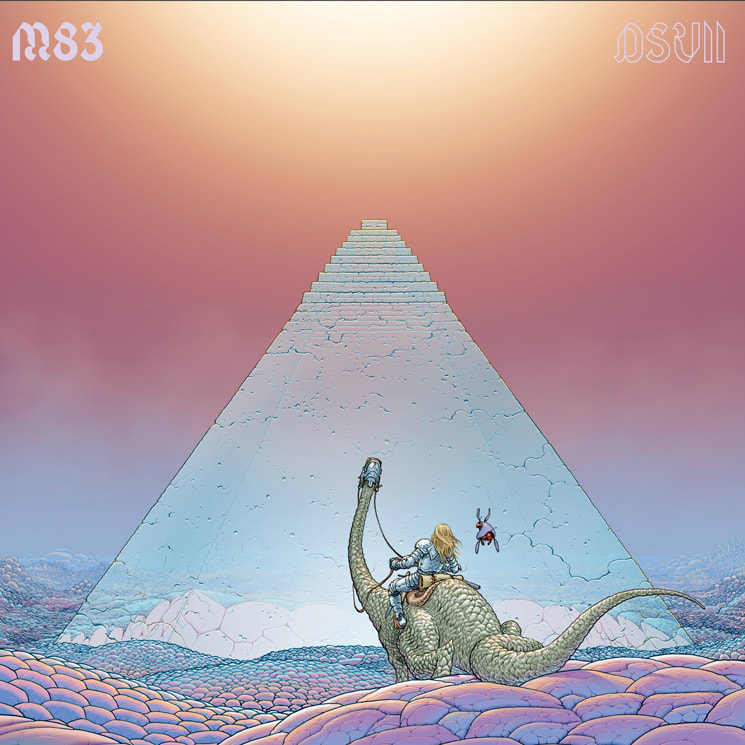One could be forgiven for wondering if we'd ever see another entry in Anthony Gonzalez's Digital Shades series. Inaugurated way back in 2007, the original's "Volume One" subtitle has been dangling for over a decade now.
The arrival of DSVII makes it a proper series at last, and while some of us would likely prefer a proper follow-up to 2016's excellent Junk, the good news is that much of this release sounds like it was composed from ideas left over from that album. As such, it sometimes gets lost in the shadow of its predecessor, but even minor work like this is interesting coming from Gonzalez, and his collection of vintage synths remains a pleasure to hear.
While many of the settings Gonzalez uses here will indeed sound familiar, he takes them in different directions on DSVII, favouring expansive and contemplative modes over pop hooks. Inspired by vintage video games, the album's '80s fantasy cover art drives the point home and acts as a good guide to the vistas you're invited to travel here. Opener "Hell Riders" sets the tone perfectly with a slow-burning synth hum that eventually forms the backdrop to a plucked-string melody that will have your elf ears a-quiver, for instance, and it's the first of many tracks that conjure slow pans of fantasy landscapes.
Other tracks seem like sketches that could have grown into fuller songs if Gonzalez had wanted them to, and you do sometimes get the sense that a certain amount of cleaning out the hard drive is going on here — "A Word of Wisdom" just sounds like a warm-up exercise for "For the Kids" from Junk for instance, but it's beguiling nonetheless, and Gonzalez has a real knack for yearning and wistful melodies that fit these slighter pieces perfectly. He isn't afraid to go big sometimes though, with album closer "Temple of Sorrow" offering up an epic journey that culminates in Gonzalez's trademark cascading synth drums.
It's on these longer, wide-angle tracks that the album really shines, and fans who thought the stricter pop playbook Gonzalez has been using recently was perhaps too strict should find much to like in these more open-ended pieces. For the rest of us, DSVII should prove a likable enough diversion until the next standard studio release.
(Mute)The arrival of DSVII makes it a proper series at last, and while some of us would likely prefer a proper follow-up to 2016's excellent Junk, the good news is that much of this release sounds like it was composed from ideas left over from that album. As such, it sometimes gets lost in the shadow of its predecessor, but even minor work like this is interesting coming from Gonzalez, and his collection of vintage synths remains a pleasure to hear.
While many of the settings Gonzalez uses here will indeed sound familiar, he takes them in different directions on DSVII, favouring expansive and contemplative modes over pop hooks. Inspired by vintage video games, the album's '80s fantasy cover art drives the point home and acts as a good guide to the vistas you're invited to travel here. Opener "Hell Riders" sets the tone perfectly with a slow-burning synth hum that eventually forms the backdrop to a plucked-string melody that will have your elf ears a-quiver, for instance, and it's the first of many tracks that conjure slow pans of fantasy landscapes.
Other tracks seem like sketches that could have grown into fuller songs if Gonzalez had wanted them to, and you do sometimes get the sense that a certain amount of cleaning out the hard drive is going on here — "A Word of Wisdom" just sounds like a warm-up exercise for "For the Kids" from Junk for instance, but it's beguiling nonetheless, and Gonzalez has a real knack for yearning and wistful melodies that fit these slighter pieces perfectly. He isn't afraid to go big sometimes though, with album closer "Temple of Sorrow" offering up an epic journey that culminates in Gonzalez's trademark cascading synth drums.
It's on these longer, wide-angle tracks that the album really shines, and fans who thought the stricter pop playbook Gonzalez has been using recently was perhaps too strict should find much to like in these more open-ended pieces. For the rest of us, DSVII should prove a likable enough diversion until the next standard studio release.
